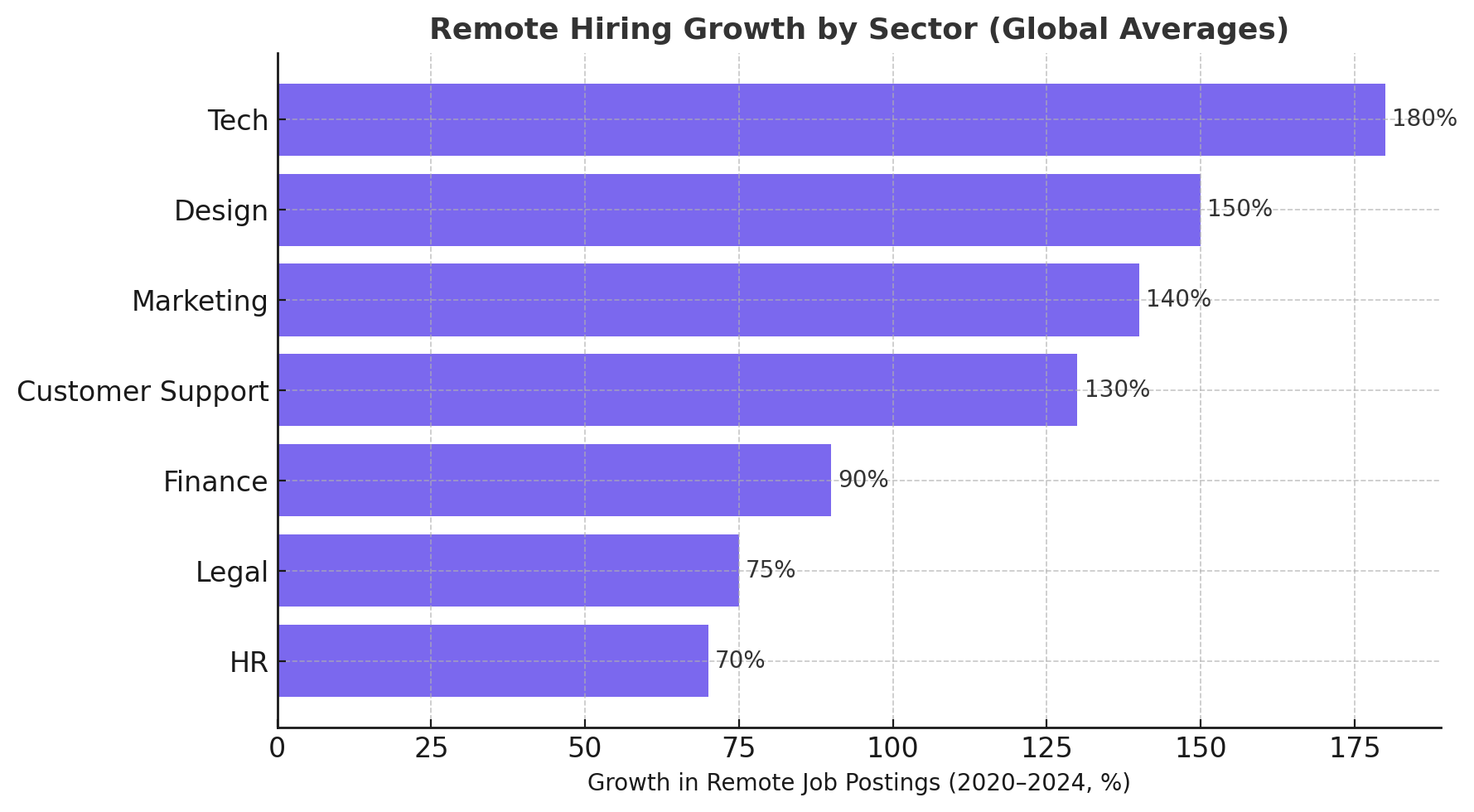In March 2020, millions of workers packed up their laptops, stepped out of offices—and never came back. What started as an emergency shift during a global pandemic has become a permanent transformation of how companies hire, manage, and think about talent. Remote work didn’t just change where we work. It changed who gets hired, how careers evolve, and what skills matter most in a global economy.
Three years later, we're not going back. Remote work has flattened the hiring landscape, turning formerly local job markets into global talent platforms. This isn’t just a workplace trend—it’s a reimagining of how work fits into life, and how companies compete for talent across time zones, not ZIP codes.

🧳 Who’s Getting Hired Now (and Where)
Thanks to platforms like LinkedIn, Remote OK, Turing, and FlexJobs, talent from emerging economies can now work for Silicon Valley firms—without leaving Lagos, Manila, or Warsaw.
🌐 Key transformations:
-
Companies are hiring across borders to access niche talent and reduce costs
-
Workers in underrepresented markets can earn global salaries
-
Recruiters now assess culture-fit and communication more than just time zones
-
Cities like Austin, Lisbon, and Medellín are emerging as remote work hubs
🧠 The New Must-Have Skills
Remote work favors self-directed, digitally fluent professionals. Some in-demand traits include:
-
Async communication (Slack, Notion, Loom)
-
Timezone collaboration
-
Output-driven mindset (goals > hours)
-
Cross-cultural fluency
-
Adaptability to rapid tool shifts
And yes—writing clearly is now a power skill.
💼 Emerging Roles Built for Remote
Some professions thrive particularly well in borderless formats:
| Remote-First Careers | Why They Thrive Remotely |
|---|---|
| Software Developers | Tools, codebases, workflows already online |
| Product Managers | Cross-functional + async by nature |
| Digital Designers | Output-driven, tool-flexible |
| Content Strategists | Writing, planning, remote-friendly |
| Customer Success | Virtual onboarding and retention |
⚖️ But It’s Not All Freedom and Flexibility
Global remote hiring brings new challenges:
-
Wage disparity: Same work, different pay based on location
-
Tax/legal complexity: Compliance for global contractors
-
Loneliness & burnout: No more watercoolers, blurred work-life lines
-
Bias risks: Favoring fluent English speakers or certain time zones
And not every job can be remote. Health, logistics, manufacturing, and physical retail remain rooted in the real world.
🔮 Looking Ahead: The Hybrid Global Future
Remote work isn’t binary. The most likely future is “remote-fluid”—where companies blend in-office hubs with globally distributed teams. The best jobs will go to those who can collaborate across time zones, work asynchronously, and show results without being seen.
🧾 Conclusion: Talent Has Left the Building
Remote work didn’t just move people out of offices—it moved hiring beyond borders. For knowledge workers, the job market is now global, fast-moving, and skills-first. That means more opportunity, but also more competition. In this new era, your next colleague—or competitor—might be halfway around the world.
So, is your career ready for the borderless future?
📰 What’s Changing Now
-
A trend dubbed “hybrid creep” is gaining momentum: more companies are quietly (or gradually) pushing employees to come into the office more often. In 2025, about 34 % of hybrid workers are going to the office four days a week — up from 23 % in 2023.
-
Yet, despite more mandates, many return-to-office (RTO) efforts are stalling. Some firms struggle with enforcement or employee pushback, so remote work still holds ground.
-
In the U.S., 88 % of employers now offer some hybrid flexibility, though fully remote roles make up only ~12 % of new job postings.
-
Globally, workers generally resist taking a pay cut for remote work. In the euro zone, about 70 % of surveyed workers would refuse a salary reduction in exchange for maintaining their remote setup.
-
On the gender front: when men’s work becomes more remote, women’s employment rates tend to rise, partly due to shifting childcare dynamics.
-
Some researchers argue “hybrid” is already outdated: the future is blended work — where human effort, AI systems, and virtual/physical interactions merge into a new work paradigm.
🧠 My Take: The Near-Term & Long-Term Shift
I believe remote work’s golden era (fully remote everywhere) is moderating — but flexibility is here to stay. Here’s how I see things:
-
Hybrid becomes the baseline, not the exception. Fully remote roles will be rare, except in niche or high-autonomy sectors. Most workers will split time between home and office, with the exact mix depending on role and team.
-
“Hybrid creep” is double-edged. Some incremental return mandates make sense (for onboarding, collaboration, culture), but if exploited, they risk alienating top talent. Especially as remote work is a competitive advantage in hiring.
-
Workers will push back hard on pay cuts or role downgrades tied to remote flexibility. If a job can be done remotely, the default expectation should not include removing or penalizing that option.
-
Upskilling and tool fluency will matter more than ever. As hybrid becomes default, the workers who thrive will be those who can switch contexts, communicate asynchronously, and leverage AI or collaboration platforms fluidly.
-
Company culture and mental well-being will be tests of leadership. The hidden stress, “quiet burnout,” and social isolation dangers are real. The leaders who succeed will be the ones who build intentional connection, not just mandate presence.
-
The “blended work + AI” shift could reshape roles faster than we expect. The nature of collaboration, autonomy, and output measurement will evolve — and those who adapt early will gain advantage.
✅ Conclusion
Remote work hasn’t reversed course — but it’s settling into a new equilibrium. The pendulum won’t swing back to 100 % office life, but the “everywhere work” moment has matured. As we move ahead, the winners will be organizations and individuals who balance flexibility, clarity, culture, and performance. Change is constant — adapt or get left behind.






